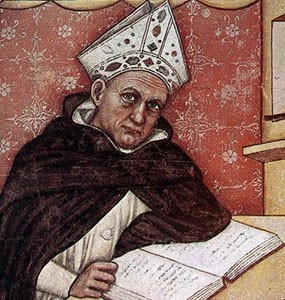Introduction | Life | Work | Books

Albertus Magnus
(From a fresco in Treviso, Italy, 1352)
|
|
Albertus Magnus (AKA St. Albert the Great or Albert of Cologne) (c. 1200 - 1280) was a 13th Century German philosopher, theologian and scientist of the Medieval period. He is mainly associated with the dominant Medieval movement of Scholasticism, and his influence on the development of Scholastic philosophy in the 13th Century was enormous, especially his incorporation of Aristotelianism into the Christian west. He is also known as an early advocate for the peaceful coexistence of science and religion.
Albertus was born, sometime between 1193 and 1206, to the knightly family of the Count of Bollstädt in Lauingen in Bavaria, Germany. He was educated principally at Padua in Italy, where he received instruction in Aristotle's writings. In 1223 he became a member of the Dominican Order, against the wishes of his family, and studied theology at Bologna in Italy and elsewhere. Later, he returned to Germany to teach at Cologne, Regensburg, Freiburg, Strasbourg and Hildesheim.
In 1245 Albertus went to Paris to receive his doctorate and to become provincial of the Dominican Order. He taught for some time as a master of theology in Paris with great success, and it was during this period that his most famous student St. Thomas Aquinas began to study under him. He fulfilled duties as Bishop of Regensburg from 1260 to 1263, walking rather than riding across his huge diocese, and then spent the remainder of his life in semi-retirement, studying and preaching throughout southern Germany.
He died in 1280 in Cologne, Germany, after two years of ill health. Contemporaries such as Roger Bacon and Dante Alighieri (1265 - 1321) applied the term "Magnus" ("the Great") to Albertus during his own lifetime, referring to his immense reputation as a scholar and philosopher, and he remained steadfast in his defense of the orthodoxy of his former pupil, St. Thomas Aquinas, whose death in 1274 greatly grieved Albertus. He was beatified in 1622, and honored by the Catholic Church as a Doctor of the Church in 1931.
Albertus wrote prolifically (his collected writings were collected into 38 volumes in 1899), and was perhaps the most widely read author of his time. He was famed for his literally encyclopedic knowledge of topics as diverse as logic, theology, psychology, botany, geography, astronomy, astrology, mineralogy, chemistry, zoology, physiology, phrenology and others.
Most modern western knowledge of the works of Aristotle was preserved and presented by Albertus, and he digested, interpreted and systematized the whole of Aristotle's works (from the Latin translations and notes of Arabian commentators such as Averroës and Avicenna) in accordance with church doctrine, and with occasional divergences from the opinions of the master. His approach to this task, however, was clearly influenced by Neo-Platonism. His principal theological works are a commentary in three volumes on the "Books of the Sentences" of Peter Lombard (c. 1100 - 1160), and his "Summa Theologiae" in two volumes.
Albertus's knowledge of physical science was considerable and (for the age) remarkably accurate, aided by his protracted study of Aristotle, which gave him great powers of systematic thought and exposition. He is credited with the discovery of the element arsenic, and there is much speculation on his work as an alchemist. He was certainly deeply interested in astrology, as were many scientists of the time, arguing that an understanding of the celestial influences affecting us could help us to live our lives more in accord with Christian precepts.
Albertus is also known for his enlightening commentary on the musical practice of his times, and wrote extensively on proportions in music, on the ways in which music worked on the human soul, and on his categorical rejection of the popular notion of the "music of the spheres".
| Albertus Magnus (AKA St. Albert the Great) Books |
Back to Top |
See the additional sources and recommended reading list below, or check the philosophy books page for a full list. Whenever possible, I linked to books with my amazon affiliate code, and as an Amazon Associate I earn from qualifying purchases. Purchasing from these links helps to keep the website running, and I am grateful for your support!
|
|
